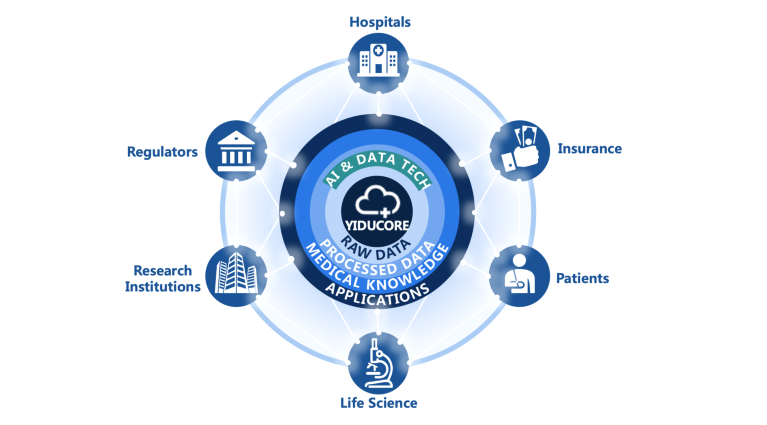
Leveraging the medical AI brain YiduCore, Yidu Tech provides evidence-based medical solutions and services driven by AI and data technologies.Credit: Yidu Tech
In China, a new generation of city-level data and artificial intelligence (AI) platforms for epidemic monitoring are working towards providing accurate prevention and timely judgement to contain COVID-19 outbreaks. In extracting computable data from epidemiological investigations to build a monitoring and alert system, AI models and machine learning technologies, such as natural language processing (NLP) and symbolic knowledge graphs, may help improve efficiency and minimize social disruption.

Jun Yan, CTO and Chief AI Scientist of Yidu Tech.Credit: Yidu Tech
Medical technology companies, such as Yidu Tech, have taken part in operating such platforms in more than 10 cities in China. Starting with Wuhan, where the first COVID-19 outbreak emerged, their team has provided AI and big data technology platforms which help to accelerate outbreak control strategies and forecast alerts in Beijing, Guangzhou, Shenzhen, Ningbo, and other Chinese cities.
“We are building a completely new smart public health system for COVID-19,” says Jun Yan, CTO and Chief AI Scientist of Yidu Tech. “Through data processing and analysis, model building, and data security technology and management, we accelerate case tracking, policy decision, and collective actions.”
Computable epidemiological data
Epidemiological investigation, which involves data collection and analysis to determine the cause of illness and to implement control measures to prevent additional illness, is essential for infectious disease control.
For example, with new outbreaks of the COVID-19 pandemic, disease control experts in China need to precisely identify areas and close contacts with potential risks

Supporting local authorities to contain COVID-19 outbreaks in China is one of Yidu Tech’s priorities.Credit: Erlon Silva - TRI Digital/ Moment/Getty
“An average epidemiological report contains information for experts to analyse trajectory and high-risk groups, which could limit efficiency and become error-prone. This sounds like the perfect kind of jobs for machines, but the problem is that manually inputted data is not immediately computable: how can you maintain formatted descriptions for all the entries of place, event and time?” Yan asks.
In response to such pain points, NLP technology was adopted. This is a process of reading the original natural language text by machine, de-structuring the information, and standardizing it through semantic association.
Through NLP technology, complete fields may be automatically extracted from epidemiological reports. Inputting these data into the decision-making engine of the AI platform, and by means of collision detection, which is the computational problem of detecting the intersection of two or more objects, helps determine and visually present high-risk groups and areas.
“In this way, work that originally took two people a day to complete has been shortened to just five minutes for browsing and reviewing,” says Yan. “The fight against the pandemic is a race against time – and we are keen to save every second of it by improving our technologies.”
Dynamic monitoring for alert and prevention
The most commonly used model in traditional public health systems, to predict epidemic trends, is called SEIR (susceptible–exposed–infectious–recovered), which is a transmission dynamics model. But in the process of implementation, it is difficult to estimate the parameters.
“There are different variables resulting from SEIR, take school policies as an example: how should we decide if students can return to campus or home study – and for how long?” he says. “These parameters have to depend on the evolving situation.”
These variables are then expressed through symbols, and symbolic learning allows developers to define new relationships between the objects and concepts. This leads to the hardest part of using AI technology, which is combining symbolic knowledge with data-based models, and finally letting the model run on the new insights.
Yan says the core challenge is to build the models with a considerable amount of authorized training data, which was especially difficult at the beginning of the COVID-19 pandemic when data was not readily available.
“When Wuhan was put under lockdown and cut off from the outside world, our team took their own protective suits, sanitizers and drove all the way there from various Chinese cities,” recalls Yan. He says the team worked non-stop together with the local authority on connecting data sources and developed the demo version of what later became the Wuhan Infectious Disease Monitoring and Early Warning Platform.
Now in different Chinese cities, during the process of each city’s data collection and analysis, Yan’s team is constantly calibrating and verifying their models to make their tools and products better at solving the front-line problems and improving the resilience of the cities’ public health systems with safety, he says.

Yidu Tech is dedicated to contributing to the front-line problems of public health with city-level AI and data platforms.Credit: Yidu Tech
Health management for public good
Yan says the company is striving to leverage technologies to ease the impact of pandemic-induced restrictions on public life.
Beyond supporting public health during the pandemic, the development of Yidu Tech has encompassed medical research, healthcare support and patient management.
Yan explains that their vision of ‘data intelligence, green healthcare’ is to support the construction of a ‘safe, inclusive and value-oriented smart medical system’ for making value-based healthcare accessible for everybody and promoting people’s health.
Since its founding in 2014, Yidu Tech has focused on enhancing its data intelligence infrastructure which has covered over 600 hospitals from more than 20 provinces across the country. Furthermore, the company has provided analytics-driven and evidence-based medical solutions and services to 21 regulatory agencies and 127 life science companies.
“Yidu Tech keeps advancing our medical AI brain, YiduCore, which is now supporting healthcare professionals with medical insights and knowledge graphs covering more than 8,000 diseases,” says Yan. “Our ultimate goal is to use AI to build green health for the public good.”
This advertisement appears in Nature Index 2022 Big 5 science nations, an editorially independent supplement. Advertisers have no influence over the content.


